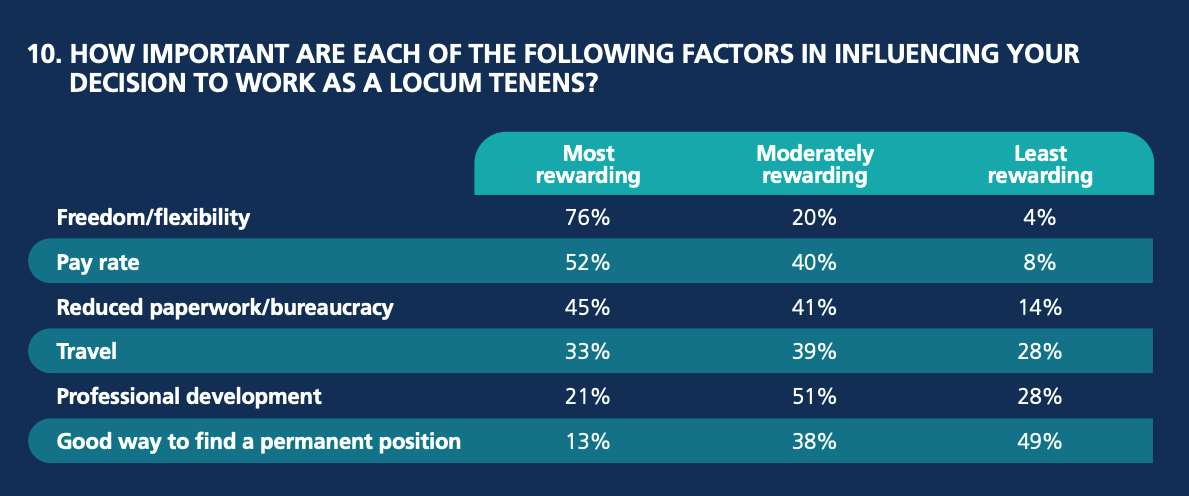Are Locum Tenens or Long-term Placements Better for your Psychiatric Staffing Needs?
IPC Staff | January 9, 2025

Psychiatry Staffing Decisions: Locum Tenens or Long-Term Placements?
With the demand for psychiatry, mental health, and addiction recovery services continuing to rise across all levels of care, healthcare leaders are exploring various emerging models to meet urgent staffing needs without losing sight of their organization’s long-term goals.
Traditionally, healthcare staffing includes full-time employees (FTE), per diem staff, and locum tenens agencies. However, these models are becoming less sustainable in response to increased demand – resulting in inefficient staffing, high turnover, and gaps in care delivery that can prevent timely access to services.
The right approach to hiring psychiatric providers can significantly improve organizational stability, care delivery, and provider satisfaction. This guide from Integrated Psychiatric Consultants (IPC) is aimed at helping leaders make informed staffing decisions.
Locum Tenens vs. Long-Term Placements: At A Glance
When is locum tenens staffing appropriate?
- Short-term coverage (e.g., for medical leaves or emergencies)
- New service offerings without long-term commitment
- Organizations uncertain about their long-term staffing needs
When are long-term placements advantageous?
- Addressing provider shortages with a focus on sustainable growth
- Establishing integrated partnerships that align with organizational goals
- Organizations seeking stability and growth, with continuity of care
Should We Use Locum Tenens for Immediate Coverage?
Locum tenens means “to take the place of” in Latin, referring to physicians who would fill in for permanent staff informally during temporary leave and emergencies. In the 1970s, this practice evolved to address healthcare staffing shortages in underserved areas. Similarly, providers working per diem – meaning “per each day” in Latin – receive their schedule on a day-to-day basis, exchanging workplace benefits for the opportunity to work across various settings.
Today, these agencies encompass a wide range of medical professionals, including physicians and advanced practice providers, such as psychiatric mental health nurse practitioners. Locum tenens and per diem providers can bring diverse perspectives, spending less than one year at a given site, on average.
In a 2024 survey, 97% of locum tenens providers said they value freedom and flexibility and 86% said they appreciate reduced administrative burden. FTE providers who are experiencing burnout are increasingly turning to short-term placements as organizations continue to rely on them to address ongoing staffing shortages. This shift can drive up staffing costs for organizations focused on ensuring access to services while lacking quality oversight and continuity of care.

Source: 2024 Survey of Locum Tenens Physicians and Advanced Practitioners – AMN Healthcare
Over half of the providers in this survey reported working at 2-3 locum tenens positions every year. Organizations hoping to recruit from short-term roles should note that transitioning to a long-term placement is the least influential factor in providers’ decisions to pursue locum tenens work.
Some advantages of short-term placements:
- Quick solution for urgent staffing shortages
- Flexible arrangements for providers and facilities
- Ideal for trial runs or coverage during leaves
Disadvantages may include:
- Lack of continuity of care for patients
- Accumulation of costs due to frequent onboarding
- Insufficient training and disruption in team dynamics
Do Long-Term Placements Support Continuity of Care?
Long-term placements are an alternative to traditional staffing models, presenting a viable solution for providers and organizations seeking high quality and continuity of care. A 2023 study published in BMC Psychiatry indicated that higher relational continuity of care for patients with serious mental illness may lower the number of emergency department (ED) visits, prevent premature deaths and suicide, and contribute to a better quality of life.
In the background, a management group like IPC works to bridge gaps in behavioral health, increase quality oversight, and ensure sustained coverage.
Key advantages of long-term placements:
- Fostering long-term compatibility and proactive consultation
- Improved outcomes and provider-patient relationships
- Emphasis on efficiency and cost-effectiveness
Disadvantages may include:
- Can take time to find the best fit
- Upfront investment in the partnership
- Not suited for short-term coverage
How Does The IPC Model Provide Strategic Staffing?
For over two decades, IPC has fostered long-term partnerships to help organizations improve access to high-quality care for their community while preserving the benefits of traditional staffing models, including flexibility and scalability. With provider and partner retention rates of over 95%, IPC offers a strategic, cost-effective approach focused on long-term success.
As a behavioral health staffing and management group, IPC creates flexibility in providers’ schedules, while offering benefits and support with the credentialing process – two of the most challenging aspects of being a locum tenens provider. IPC providers face a lower administrative burden and greater flexibility, benefiting from the stability of a traditional permanent position.
Our partnership staffing model prioritizes acute patient outcomes by providing opportunities for proactive consultation and behavioral health integration, reducing the length of stay and dependance on the ED for behavioral health visits, saving costs for healthcare organizations.
From the initial placement and integration to regular check-ins with dedicated support, IPC strives for collaboration between providers and organizations at every stage.
The IPC Model also fosters a cohesive healthcare environment, building trust and encouraging positive team dynamics. When establishing a strategic partnership, psychiatric providers are pre-screened and aligned with the organization’s mission to reduce initial turnover. In turn, our partner organizations benefit from greater efficiency in hiring practices, with fewer onboarding and training demands compared to short-term placement agencies. Providers and organizations can also benefit from a widespread network of psychiatrists, addiction specialists, nurse practitioners, physician associates, psychologists, and mental health clinicians for consultation.
Choosing IPC over locum tenens is not only a financially strategic decision, it’s a commitment to high retention rates and quality and continuity of care.
Contact us today to explore how our strategic partnerships for care can meet your staffing needs while driving lasting success that benefits patients, providers, and organizations alike!
Recent Posts
The State of Telehealth Services for Psychiatry
IPC Staff | November 13, 2025
Visit our Booth at AACAP’s 2025 Annual Meeting
IPC Staff | October 20, 2025
Visit us at ACMHCK 2025 from September 23-25
IPC Staff | September 21, 2025
Telehealth is Health: Celebrating Progress During Telehealth Awareness Week 2025
IPC Staff | September 17, 2025
Let’s Connect at the Colorado Behavioral Health Conference, Sept 17-20, 2025
IPC Staff | September 13, 2025
